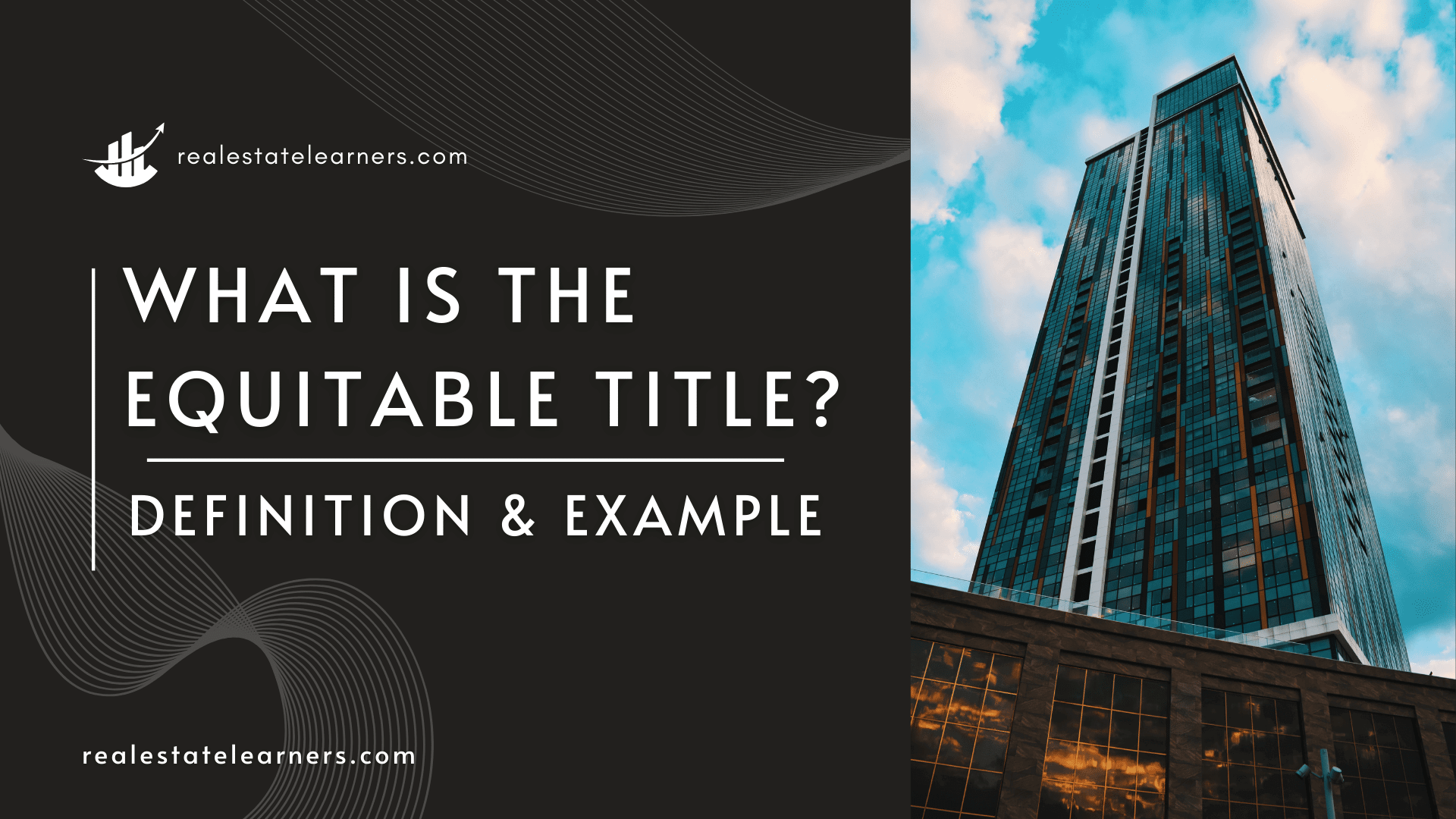In some legal systems, there are two types of property ownership: legal title and equitable title. Legal title is the documented proof of ownership in a public record such as a deed or a court order.
On the other hand, equitable title refers to an owner’s right to use and possess real estate or personal property even though they may not have full legal title. This article will discuss what equitable title means and how it differs from legal title.
What is the equitable title?
Equitable title definition refers to the ownership interest in a property. It represents the right to obtain full ownership of the property at some point in the future. This type of title is different from legal title, which is the actual ownership of the property.
Equitable title real estate arises when parties agree or understand that one person will hold and manage the property for the benefit of another. This can occur in a trust, where a trustee holds legal title to the property, but the beneficiary holds equitable title.
In some cases, equitable title may also refer to an interest in personal property or assets that still need to be fully owned by someone.
What is the Example of Equitable Title in Real Estate?
Joshua is a real estate agent who has sold many properties over the years. Recently, he was contacted by a client named Maria, who wanted to purchase a new house.
Per their agreement, Joshua helped Maria find her dream home, and they signed all the necessary documents to transfer ownership. However, before the official transfer took place, Maria’s financial situation changed drastically, making it difficult for her to meet the payments. In this case, Joshua suggested an equitable title be created.
An equitable title is a legal concept that grants the buyer or borrower certain rights and interests in a property even before the official transfer of ownership has occurred. In simpler terms, it means that Maria would have an “equitable” or fair claim to the property, even though she has not fully paid it. This gives Maria some ownership and control over the property while still paying for Joshua.
This arrangement benefits both parties as it protects Joshua’s interests as the seller and gives Maria a sense of security in knowing she has some rights over the property. Once Maria completes her payments, an official ownership transfer will occur, and Maria will become the legal owner of the property.
What are the Advantages of Equitable Title-
A few advantages to having an equitable title in a real estate transaction exist.
Protection for the Buyer: In situations where a buyer’s financial circumstances change, having an equitable title can provide some protection. The buyer can still have some ownership and control over the property while they work towards completing their payments.
Potential for Early Occupancy: With an equitable title, the buyer may be able to move into the property before the official transfer of ownership takes place. This can be beneficial for those who need to relocate or are in urgent need of a new home.
Potential for Improvements: As the equitable owner, Maria would have some control over the property and could potentially make improvements or renovations while still making payments. This can benefit those who want to own the property before fully owning it.
Protection for the Seller: Equitable title also benefits the seller by ensuring they will still receive payment if the buyer’s financial situation changes.
Potential for Higher Selling Price: In some cases, a seller may be able to sell a property for a higher price if they offer equitable title to buyers. This can attract more buyers who may have yet to have the full funds upfront but are still interested in the property.
What are the Disadvantages of Equitable Title-
While there are advantages to equitable title, it is important also to consider the potential disadvantages.
Limited Ownership Rights: While having an equitable title grants some ownership and control over the property, it is not the same as being the legal owner. This means that certain property decisions may still require the seller’s approval.
Potential for Disputes: In some cases, there may be disputes between the buyer and seller over the terms of the equitable title. This can lead to delays or legal complications in the transfer of ownership.
Possible Additional Costs: Depending on the agreed-upon terms, having an equitable title may come with additional costs, such as interest payments or legal fees.
Risk for Both Parties: Equitable title carries a certain level of risk for both the buyer and seller. The buyer risks losing their investment if they cannot complete payments, while the seller may face financial losses if the buyer defaults on their payments.
What is the difference between a legal title and an equitable title- write in bullet points and explain each point.
Legal title refers to the actual ownership and control of a property, while equitable title only grants the right to use and enjoy the property.
Legal title is recognized and recorded by law, while equitable title may not be documented but can still be enforced in court.
Legal title can only be transferred through a legal process, such as a deed or contract, while equitable title can be transferred through various arrangements, such as a trust or purchase agreement.
The legal title gives the owner full rights and responsibilities over the property, while the equitable title may come with certain limitations or conditions set by the legal owner.
In cases where there is a conflict between legal and equitable titles, legal title will always prevail in court. This means that even if someone has an equitable title, the legal owner has the final say over the property.
Legal titles can be easily transferred or sold without any restrictions, while equitable titles may come with certain restrictions or conditions set by the legal owner.
In some cases, someone may hold both legal and equitable title to a property. This can happen when the legal owner also has a mortgage on the property, and the buyer has equitable title until they pay off the mortgage.
Frequently Asked Questions
Is equitable title the same as legal ownership?
No, equitable title grants some rights and interests in a property, but it is not the same as being the legal owner.
What happens if the buyer defaults on their payments?
If the buyer defaults on their payments, the seller may take legal action to reclaim ownership of the property, or they may be able to keep any payments.
What happens if the buyer defaults on their payments?
If the buyer cannot complete their payments, the seller may take legal action to reclaim property ownership. The equitable title agreement should clearly outline the terms and consequences of default.
Can an equitable title be transferred to someone else?
Equitable titles can usually only be transferred to someone else with the seller’s consent. This should be clearly outlined in the agreement.
How long does an equitable title last?
The duration of an equitable title will depend on the terms agreed upon by both parties. It could last until the buyer completes their payments or for a specific period, as stated in the agreement.
Conclusion
This article has provided enough information on equitable title and its importance in real estate transactions. Equitable title is clearly defined as the right to obtain full legal title to a property in the future. It can be created through various means, such as a purchase contract, adverse possession, or inheritance.
Equitable title plays a crucial role in real estate transactions as it allows individuals to be interested in a property even before the transfer of legal ownership occurs. This can provide financial security and stability for individuals, especially when they cannot obtain full legal title immediately.

Corey has over 15 years of experience as a real estate broker and educator. He is dedicated to providing valuable insights and guidance for those looking to enter the real estate industry.

